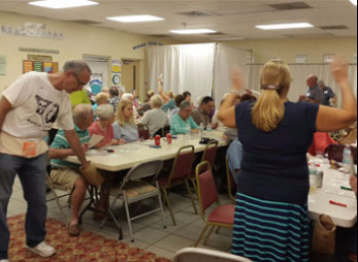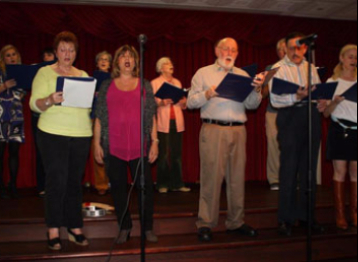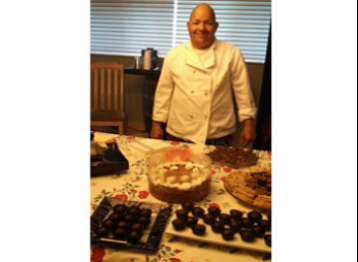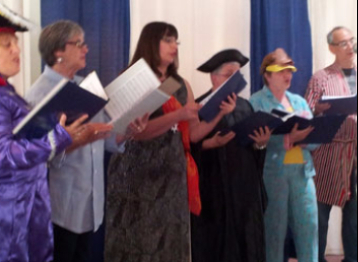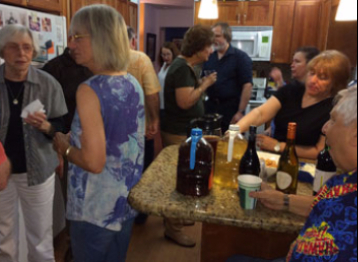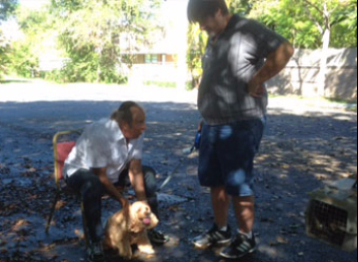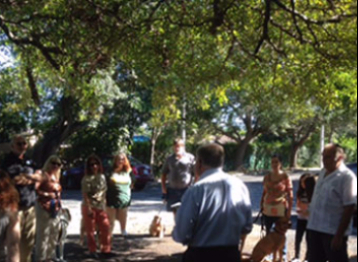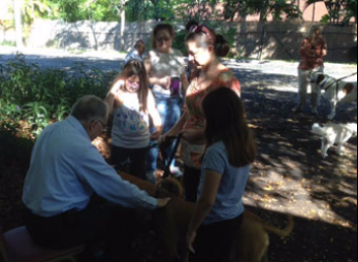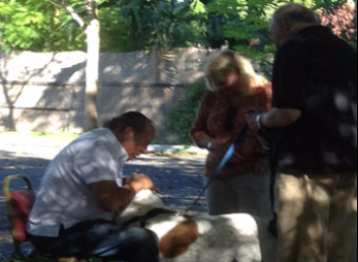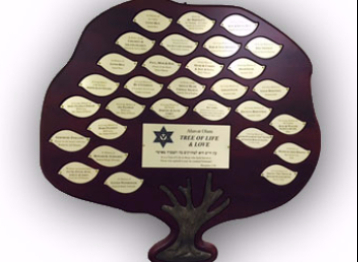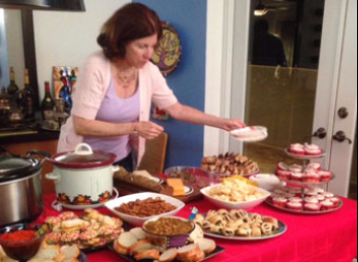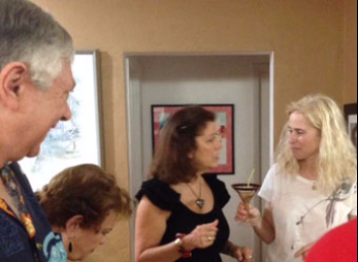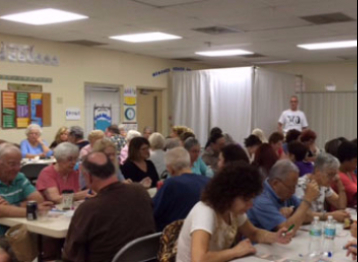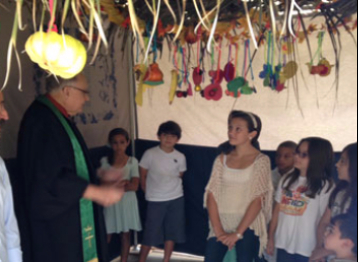On this day of Rosh Hashanah, I would like to take you back about 11 or 12 years, to the end of the last decade, when scientists, computer programmers, politicians and just about everyone else were very worried about the Y2K problem. Doomsday prophets predicted the end of the world as we knew it. Well the world is certainly very different than we knew it at that time, but not because of some missing ones and zeros in the matrix of programming codes, but because the world has been turned on its head by unexpected events that left many of us shouting the title of the musical "Stop the World I Want to Get Off." In just this short span of time, monstrous events such as 9/11, wars in Afghanistan and Iraq, Hurricane Katrina, earthquakes, tsunamis, a nuclear meltdown, powerful uprisings in Egypt, Libya and Syria, a banking and stock market near collapse in our country, and now a European financial crisis, have all changed this world irrevocably. Of course, during this same period, many positive changes have also occurred. Cell phones now enable us to be in constant communication, email has replaced snail mail, computers have revolutionized business, education and our personal lives, and permit us to accomplish in seconds, laborious tasks that might have taken days in the past. Computers have also enhanced communication and made face to face conversations between people thousands of miles apart a reality through programs like Skype. (While I personally view these as positives, I realize that some people, ---well, not much). But regardless of if we like it or not, we must accept the reality. As in the words of the song Rabbi Danny often sings at sacred events, "Everything Must Change."
These past few years has seen an economy worse than anything since the Great Depression. Many people are hurting and feeling the pain caused by financial loss, job insecurity and uncertainty. Some of us have a feeling of helplessness as we watch the stock market drop 500 Dow points one day, followed by weeks of huge swings in the market, both up and down, and what it means for our shrinking savings, investments and retirement portfolios. The recent debacle surrounding the need to raise the debt ceiling in our country, points out the severe divide among our politicians and, for that matter, among the people of the United States. Two very different views of how to shape our government exist today but, unlike in years past, our political leaders are reluctant to consider a middle ground.
Most of us would probably agree that personal greed contributed to cour current predicament. There is plenty of blame to go around. Was it Wall Street, the politicians, or the media that whipped us into a frenzy? It was all of these. But let's be honest. It was not just the greed of large companies and politicians that caused the crisis. It stemmed from us too. Maybe not you or me particularly, but people in general, spending beyond their means to keep up with the Schwartz's, trying to make a killing in the market or over-stating their income to qualify for a loan they couldn't really afford, perhaps to purchase an over-priced home bigger than they needed. These also helped cause and fuel this crisis. A quote from Gandhi comes to mind: "there is enough in this world for everyone's need, but not for everyone's greed." We have reached the precipice and seen the abyss, and it's not pretty.
While the current economic crisis may seem like a strange topic for Rosh Hashanah, I think it's important to speak about the financial situation because it's on most people's minds anyway. At times such as these, many of us turn to religion for comfort. It can bring us a message of hope and faith. I believe Judaism has a great deal to offer us in times of trouble, and is extremely relevant and pertinent to how we live our lives and how we cope with life's challenges. A critical piece of advice to weather the crisis is to stay calm during the storm, to look long term at the big picture, and not to panic, all messages consistent with the spirit of the Days of Awe. Who better than us understands the importance of looking "long term"?As a 3,500 year old people who have survived so much, one of the things we can learn from our history is the value of endurance, perseverance and maintaining faith. Faith in the Almighty helps to reassure us in times of uncertainty. The Bible firmly declares and reassures us that we go through life knowing that we are not alone. Belief in God brings comfort in times of stress. We dare not belittle the depth of this crisis, but maintaining our perspective is helpful, for one's attitude affects how we deal with situations we confront. In other words, how we view a situation plays an important role in how we respond to it.
Throughout the year we Jews are commanded to be happy. We are told to serve Adonai with joy and come into G-d's presence with song. So who is happy? The learned ones tell us it is those who are content with, and truly appreciate, their lot. Now lot does not mean the cards that circumstance has dealt you or the material possessions you've amassed, but rather those lifetime characteristics that you have sought out, acquired and nurtured for yourself; a sound body, a loving spouse or significant other, your career your friends, your community, your hobbies and leisure activities, your inter-personal relationships and of course, your relationship with G-d.
These High Holy Days are like our annual tune-up, when we come into "the shop" to realign our values. By reciting our prayers, by spending the day of Yom Kippur in solemn convocation with G-d, our Rabbi and our synagogue community, we are reminded of what our values should be. Hopefully, even in this difficult economic time, we can come away from these days of intense prayer and introspection with a renewed realization of the truly important things in our life, our good fortune, and the any miracles that surround us. Our temple, Ahavat Olam, is a vibrant congregation that has committed to nurture and celebrate your connection to G-d with you, to cultivate a love and understanding of the Jewish heritage, uphold the teachings of Torah and to strengthen our community through the wholehearted practice of Tikkun Olam, repair and healing of the world. Though we are a relatively small congregation, we are a full service synagogue offering inspiring Shabbat services 52 weeks of the year, often including our beloved Prima Bima Band and our all volunteer Choral Society. There's a lot that happens in the Temple on Shabbat. If's where we go to connect with G-d and one another. Of course the scrumptious Oneg that immediately follows each service, is not bad either. If you haven't been coming, try it . But be warned, you may find it to be habit-forming. Our Shabbos morning Bible and Brunch class and our Religious School have just been enhanced with the addition of Rabbi Jonathan Tabachnkioff to our staff.
Ahavat Olam meets the community's needs from Baby namings, Bat and Bar Mitzvahs, Weddings, Vow Renewals and Funerals. From Purim plays and holiday festival celebrations, to 2nd night Seder at Pesach. The benefits of our Temple membership are numerous and varied. But the main benefit, at least for me, is community. As you are there for us, so we are there for you. Whether you come once a year for High Holy Days or share in our services every Shabbat, your membership makes you part of our Jewish family. And, like any family, we will both delight and annoy you. Nu? What more could a Jew ask for?
We may, of course, nudge you to celebrate with us on holidays, to have your children or grandchildren participate in our religious school, to volunteer your time, to support us, and to live ethically in the world. In return our Mitzvah Angels will help you, and the congregation will pray for you or a loved one if ill or if you need assistance, and, of course, Rabbi Marmorstein will be there for you in times of loss and he will offer you his strength and guidance whenever you need it.
As most of you probably know, Ahavat Olam is a non-profit institution that receives no outside funding. Our annual membership dues and funds pledged during this season constitute the bulk of the temple's funding. Ahavat Olam is always concerned about being able to meet its financial commitments to its staff, and those we lease our facilities from, and to be able to continue funding the various programs that many of us so enjoy. The only way we can do this is if everyone who can afford to contribute and support the synagogue, does so. Through your acts of tax deductible giving, you are undertaking the most fundamental and characteristic way of being a Jew. Since the Biblical days of Exodus, when G-d told Moses to ask the people for gifts to build the Tabernacle, giving has been on e of the primary ways in which we live out a sense of gratitude as Jews, a feeling of fulfillment and accomplishment, a sense of happiness. Our tradition teaches that "to live is to give." It is quite literally a life-giving action, not only for those on the receiving end, but perhaps even more importantly, for the ones on the giving end. I'm reminded of the story that there are two seas in Israel; The Sea of Galilee and the Dead Sea. The former is full of life; fish, birds, vegetation. The latter, as it's name implies, contains no life at all. Yet both are fed by the same river, the Jordan. What then is the difference between these two bodies of water? The Sea of Galilee receives water at one end and gives out water at the other end. The Dead Sea receives but does not give. To receive without reciprocating is a kind of death.
Friends, most of us in this room are not economists and don't have a crystal ball to predict what the future will be like for us financially, but we do have the Torah and know what is expected of us as individuals and Jews. We must see to it that our Temple can pay its bills and thus remain a viable institution that will be here for us when we need it.
At this time I have both good, and, not so good, news for you. The good news is that we have more than enough money to pay all our bills for the next year. The no so good news is, that it's in your pockets. I know things are tight, but these are difficult financial times for the synagogue as well as for you. Unfortunately, synagogue giving is down all across the country. On top of that, the demographics in our immediate area, with temples closing their doors or merging, due to dwindling membership numbers, and many Jews moving to other counties or even other states, have limited the rate of growth we have been striving for. So perhaps now even more than during less trying times, we truly need your generosity. As our good friend and congregant Jeff Dorn has said in years past, "don't give until it hurts; give until it feels good." Thank you and Good Yom Tov.

